WITNESS RADIO MILESTONES
Bunyoro’s displaced in throes of despair
Published
6 years agoon
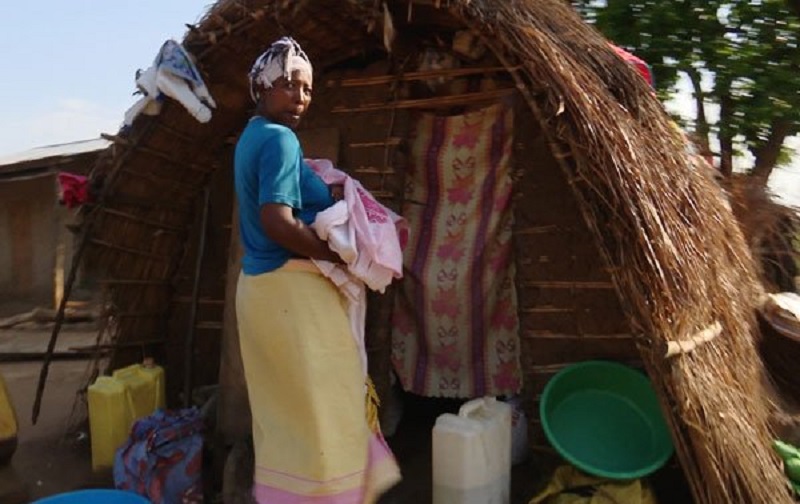
It is around 4pm when my cameraman and I arrive at Kijayo internally displaced peoples’ camp in Kikuube District, Bunyoro sub-region.
The children in the camp appear haggard and emaciated. They have not had a meal since morning and many are lying on empty and rumbling stomachs as they attempt to suppress the hunger pangs. Their families no longer have land to grow food after evictions started in 2012.
This is after Hoima Sugar Ltd, owned by Kenyan investors, purchased the contested nine square miles of land from Bunyoro Prince Herbert Kimera Rwakiswaza in 2011 to plant sugarcane in the new district of Kikuube, recently carved out of Hoima District.
The project has since left thousands of residents in the villages of Kijayo, Ikoba, Muziranduuru, Kyabataka, Kadiki, Kyakasoro and Kabango displaced and scores dead after the violent eviction on February 20, 2015.
Among those who died from their injuries were Augustine Karamira, Evylene Turyagumanawe, George Bangirana, and Francis Matovu. Matovu’s wife and three children were hacked to death using machetes. Others are Matia Mulumba, Aidah Kyarukunda, Wilson Singwire, Nakyanzi Akankunda wife to Erias Muganyizi, Hakim Sudayisi, Kiggundhu Adibayo son to Hamad Mwongerwa and Powerson Mugarura.
Deaths
The chairperson of the project-affected persons, Mr Asaba Muhereza, says in total, 26 people died, largely as a result of wounds they suffered after the attack.
The affected families now live in squalor in mud and wattle structures and others have constructed shacks adjacent to the area where they evicted. The piece of land was offered by the Local Council chairperson, Mr Edward Kasigwa, for free.
“I do not understand the way this government works; they provide all the necessary social services to refugees but we Ugandans are not catered for yet we vote them. They cannot even provide burial grounds for them that I have to bury them on my land,” reveals Mr Kasigwa.
Ms Joy Nerimasi is at pains to reveal that the graves of her husband and children were destroyed by the sugar company.
“My husband, including seven children, died but now all their graves cannot be traced; the company has planted sugarcane on them,” says Ms Nerimasi.
She lives here with her granddaughter and cannot afford to feed, clothe and take her to school. They lack adequate shelter when torrential rains pound.
Ms Nerimasi and others were forcibly evicted as police, using teargas and batons, set their homes ablaze.
She wants to return to Kijayo where she was born.
Living in shacks
Ms Gorret Kushemereire is another victim who reveals that her husband and children were killed during the eviction.
“I came from Fort Portal many years ago and we bought land here. During the forceful eviction, my husband and some of my children died while others disappeared. I cannot trace them now,” says Ms Kushemereire.
“We now sleep in shacks and my only son who would be helping me out cannot be traced,” she adds.
Ms Kushemereire says government has not been of help. “Our children cannot go to school and pregnant mothers have challenges of accessing health facilities. I continue to wonder whether I am a Ugandan or a foreigner. Why would government care about refugees and give them land instead of us nationals?”
There is barely any government presence here. Authorities from the Ministry of Disaster Preparedness in the Office of the Prime Minister or Hoima District have not come to the people’s aid to provide them with clean water, food and tarpaulin. Ms Esther Turyahebwa also sleeps in a shack with her husband and seven children. “As a woman, I need privacy with my husband but this is impossible and as we talk now, my neighbours who went to dig to get food have not returned and all the children are very hungry, they have not had anything to eat,” says Ms Turyahebwa.
Many children have dropped out of school because they have to trek long distances to study. Hoima District Chief Administrative Officer (CAO) Nathan Lujumwa told Daily Monitor that they have not acted because the matter is in court.
“Our hands are tied,” he said.
Mr Lujumwa, however, said the investor has compensated some of the claimants.
“We shall continue to push the investor to ensure that they compensate these people,” he added.
It is not yet clear why the district could not provide humanitarian aid to end the plight of the displaced as they await the court verdict.
As a result of pent-up frustration, Ms Harriet Kokwera, 78, has petitioned the President, protesting her eviction.
In April, the Permanent Secretary in the Ministry of Local Government compelled Mr Lujumwa, to follow up Ms Kokwera’s complaint. The CAO responded in his July 11 letter, saying attempts by the Hoima RDC to intervene have not yielded tangible results. “When I approached the investors of Hoima Sugar Ltd, they seemed not to know about Harriet Kokwera. After a couple of weeks, they responded to me in a letter, saying Kokwera was not a genuine claimant,” Mr Lujumwa’s letter reads in part.
Her eviction has sucked in State House, which isolates her concern from scores also affected by the eviction.
Daily Monitor has obtained a copy of an August 8 letter signed by Ms Flora Kiconco on behalf of the Principal Private Secretary to the President, Ms Molly Kamukama. The letter directs the Hoima RDC to investigate Ms Kokwera’s complaint and ascertain whether she owned a piece of land and whether she was compensated before her eviction.
In September 2017, the manager in-charge of land acquisition at Hoima Sugar Ltd, Mr Ramadus Raja Khasharan, appeared before the Commission of Inquiry into Land Matters chaired by Justice Catherine Bamugemereire.
Mr Khasharan dismissed allegations that the company evicted residents from the land.
He claimed that some of the residents settled on the land after the company had purchased it from Prince Kimera. “We have not evicted anyone,” he said.
However, the Commission established that some residents who agreed to receive compensation were paid as low as Shs30,000 for half an acre.
Though some families at Kijayo were not affected by the eviction, they continue to live in misery, earning a pittance for their toil at the sugar plantations.
In 2012, the High Court in Masindi issued a temporary injunction, halting the eviction of the locals until the main suit is disposed off. However, the investor flagrantly rejected the orders to evict these families. Though the hearing of the main suit ended in 2016, judgment is yet to be delivered. Judge Simon Byabakama, who presided over the case, has since then been appointed chairperson of the Electoral Commission.
Company accused
Buhaguzi County MP Daniel Muhairwe said the sugar company used corruption and impunity to force people off their land.
Sources revealed to Daily Monitor that some officials in Hoima Sugar Ltd have close ties with power brokers in State House.
Daily Monitor has also established that the Bamugemereire-led commission is seeking mediation between the investor and the claimants.
Hoima District Land Board has distanced themselves from the Kijayo land allocation to the investors. Mr Yostus Ireba, the chairperson of the district land board, says: “I have never reached that place because of the nature of our work. Our board has no transport to investigate such cases.”
He adds that the district land board is not responsible for the conflict because the land belonged to a private person who decided to sell it to investors.
However, Mr Ireba is concerned about the conditions in which these landless Ugandans are living in. “Those are our people; why should they be displaced?” he said.
Bunyoro Kingdom prime minister Andrew Kirungi Byakutaaga says there has been a scramble for land since the discovery of oil and gas. He says many of the kingdom subjects have been arbitrarily evicted.
“We have been asking government to mitigate the challenges that arise as a result of such evictions,” he says.
Bunyoro’s historical land problems have spilled over after the discovery of oil, throwing the locals into the throes of despair.
Related posts:
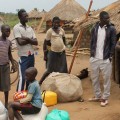
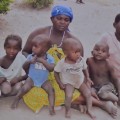 Land grabbing is costing children’s right to food and education in Mubende
Land grabbing is costing children’s right to food and education in Mubende
 Government ordered to resettle displaced Banyabindi in Kasese
Government ordered to resettle displaced Banyabindi in Kasese
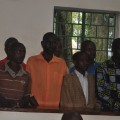 Villagers displaced by Neumann Kaffee’s plantation face another land grab in Mubende, Uganda
Villagers displaced by Neumann Kaffee’s plantation face another land grab in Mubende, Uganda
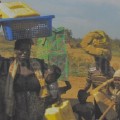 Land Inquiry Commission opens investigations into the eviction of natives from former government ranches in Bunyoro sub-region
Land Inquiry Commission opens investigations into the eviction of natives from former government ranches in Bunyoro sub-region
You may like
-


Private prosecution: Army General, police commander, presidential representative and others to be charged with over seven offenses committed while illegally evicting locals to give way to EACOP.
-


Six cattlemen opposed to the Tilenga oil project-related forced land eviction have been granted bail but will remain in prison…
-
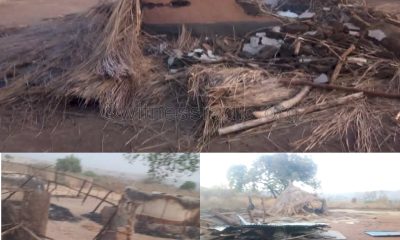

The district security committee continues to defy gov’t’s directive to return locals to their land 48 days later.
-
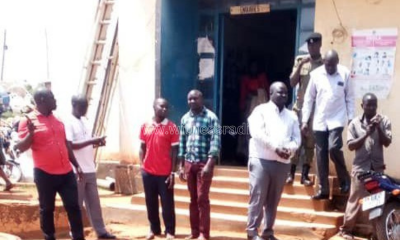

State House Anti-Corruption Unit nets a surveyor implicated in Mubende district land-grabs
-
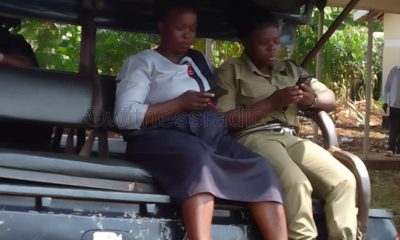

Kiboga district senior lands officer is arrested and detained over land fraud.
-


Community land rights defenders that have been on trial since 2020; are set to return to court this January.
WITNESS RADIO MILESTONES
Top 10 agribusiness giants: corporate concentration in food & farming in 2025
Published
3 weeks agoon
June 19, 2025
Today a handful of agribusiness corporations have consolidated unprecedented control over the world’s food supply, with devastating consequences for farmers, consumers and the planet. A new report by ETC Group and GRAIN examines the state of corporate concentration in six sectors critical to agriculture: commercial seeds, pesticides, synthetic fertilisers, farm machinery, animal pharmaceuticals and livestock genetics.
Corporate consolidation is increasing in most of these sectors and four of them– seeds, pesticides, agricultural machinery and animal pharmaceuticals– now meet the definition of an oligopoly, in which four companies control more than 40% of a market. Concentration can be even higher at the national level, as is the case with synthetic fertilisers.
Top findings from the report include:
- Oligopolies dominate key sectors: Bayer, Corteva, Syngenta, and BASF control 56% of the global commercial seeds market, and 61% of the pesticides market.
- Profiteering amid global crises: Agribusiness giants have exploited crises like the Ukraine war and the COVID-19 pandemic to inflate prices. Fertiliser companies, for instance, saw revenues soar by 57% from 2020 to 2023, with some accused of price gouging.
- Digital and biotech expansion: Corporations are rapidly integrating AI, gene editing, and digital platforms into agriculture through partnerships with Big Tech companies. These technologies enable data extraction from farmers, facilitate carbon credit schemes, and tighter control over food systems—while raising concerns about biosafety, privacy, and corporate monopolies.
Source: grassrootsonline
Related posts:

 A corporate cartel fertilises food inflation
A corporate cartel fertilises food inflation
 Food inflation: The math doesn’t add up without factoring in corporate power
Food inflation: The math doesn’t add up without factoring in corporate power
 African governments are giving in to corporate pressure and undermining local seed systems – report
African governments are giving in to corporate pressure and undermining local seed systems – report
 The United Nations Food Systems Summit is a corporate food summit —not a “people’s” food summit
The United Nations Food Systems Summit is a corporate food summit —not a “people’s” food summit
WITNESS RADIO MILESTONES
Land grabbers evict 360,000 Ugandans in 2024
Published
8 months agoon
November 20, 2024
A staggering 363,021 Ugandans were displaced due to forced land evictions between January and June 2024, according to a new report by Witness Radio Uganda.
The report documented 90 cases of land evictions during this period, with nearly four incidents occurring weekly, affecting over 15,126 people and threatening 5,060 hectares of land nationwide.
The Central region was the epicenter, recording 52 eviction cases, followed by 24 in the Western region, eight in the Northern region, and six in the Eastern region. Alarmingly, the report estimated that 2,160 Ugandans face eviction daily, with 723 hectares of land at risk of being grabbed every day.
VIOLENCE AND HUMAN RIGHTS VIOLATIONS
Despite government promises and directives from President Museveni to halt evictions, land grabbers have routinely ignored these orders, often resorting to violence. Armed security forces, private militias, and police were reported to have carried out the majority of the evictions.
Of the reported cases, 37 were enforced by armed gangs on behalf of evictors, 25 involved Uganda Police, five were carried out with the participation of UPDF soldiers, and four were linked to private security companies.
“The egregious levels of impunity exhibited by land grabbers have left communities defenseless, creating an environment where their human rights are trampled without consequence,” said Jeff Wokulira Ssebaggala, country director of Witness Radio Uganda.
He called for accountability and justice, warning that the unchecked power of influential individuals and entities leaves marginalized communities vulnerable and without recourse.
DRIVERS OF EVICTIONS: INDUSTRIALIZATION AND LAND-BASED INVESTMENTS
The report identified the government’s push for industrialization and land-based investments as the primary drivers of forced evictions. Land is increasingly targeted for oil and gas extraction, mining, agribusiness and tree plantations for carbon offsets. While some of this land is already under development, other parcels remain vacant but are guarded by military personnel and private security firms.
Ssebaggala emphasized that industrialization must balance economic development with the protection of smallholder farmers’ rights to land and food security.

TRAGIC STORIES
The report highlighted harrowing cases that underscore the human toll of forced evictions. In Nakasongola, smallholder farmer Dan Ssebyala was ambushed and killed by armed men following a confrontation over disputed land. The district has become a hotspot for violent evictions involving absentee landlords and powerful investors.
Ismael Bwowe, a disabled father of 20, recounted how his land was confiscated after he demanded fair compensation. He faced intimidation, arrests and false charges from state authorities, including being accused of robbing an influential individual. Bwowe claimed that Total Energies offered legal support and representation on the condition that he accept their compensation terms.
“I refused,” he said, adding that the pressure to relinquish his land remains intense. The report underscores the urgent need for reforms to address forced evictions, ensure accountability, and protect the rights of vulnerable communities. Without meaningful intervention, Uganda risks deepening inequality and undermining the livelihoods of smallholder farmers who are essential to the country’s food security.
FAMILY JAILED AMID LAND DISPUTE
The plight of Richard Ssebagala, his wife Prossy Namande, and their relative Anania Ngabirano, residents of Kabubu-Kabongo village in Nansana Municipality, Wakiso district, highlights the human toll of Uganda’s ongoing land disputes. The family spent nine months in prison following their arrest on January 10, 2024, under controversial circumstances.
ARREST AND ALLEGATIONS
The arrests occurred at 1am, during a raid by officers from Luweero police station. Police reportedly banged on the doors and forcefully detained the family, accusing them of aggravated robbery. However, the family believes the arrest was a tactic linked to a land dispute with Benon Ntambi, a man who allegedly grabbed their land.
Before the arrests, Ntambi had reportedly destroyed crops, including tomatoes, potatoes, and bananas, on the contested land. While the family was incarcerated, a new building was constructed on their land, which is now occupied, raising further questions about the motivations behind their detention.
CALLS FOR JUSTICE
The case has drawn attention from Witness Radio Uganda, which has urged the government to take immediate action to address land grabbing and illegal evictions. The organization emphasized the need to strengthen land laws and protect vulnerable communities from abuses.
It also called for greater accountability in institutions such as the Uganda Police Force, the army and land registries, which are often accused of corruption and favoritism toward the wealthy.
“The government must prioritize justice for victims of illegal evictions and address systemic corruption that leaves the poor defenseless against land grabbers,” Witness Radio Uganda stated.
BROADER CONTEXT
This case underscores the broader issue of land conflicts in Uganda, where vulnerable families are often caught in disputes with powerful individuals or entities. Advocacy groups warn that the failure to address these issues not only erodes public trust but also perpetuates inequality and injustice.
As the government faces mounting pressure to act, the story of Ssebagala and his family serves as a stark reminder of the urgent need for reforms to protect land rights and ensure justice for those impacted by land disputes.
Source: The Observer
Related posts:

 Local land grabbers evict villagers at night; foreign investors cultivate the same lands the next day
Local land grabbers evict villagers at night; foreign investors cultivate the same lands the next day
 Uganda: Land-grab victim communities will join counterparts in commemorating the 2024 International Day of Struggle Against Industrial Plantations.
Uganda: Land-grab victim communities will join counterparts in commemorating the 2024 International Day of Struggle Against Industrial Plantations.
 Mubende Land Grab: Witnessradio.org presents another petition to Land Inquiry Commission, Wants All Titles being used to evict Natives to be Investigated
Mubende Land Grab: Witnessradio.org presents another petition to Land Inquiry Commission, Wants All Titles being used to evict Natives to be Investigated
 A Nullity? Ugandans Query Constitutional Land Amendment Bill
A Nullity? Ugandans Query Constitutional Land Amendment Bill
WITNESS RADIO MILESTONES
Uganda: Community members violently evicted by security forces, allegedly related to EACOP; incl. co. responses
Published
8 months agoon
November 18, 2024
On 10 February 2023, more than 2,500 community members were forcibly evicted from their land in Kapapi village in Hoima district in Western Uganda by security forces, receiving no compensation or resettlement.
Witness Radio, an Ugandan non-profit organisation comprised of human rights investigative journalists, lawyers, and social workers, said that many people were wounded during the eviction, women were raped, and houses were destroyed.
Witness Radio said its investigations found that this eviction occurred to clear the path for the Tilenga feeder pipeline, part of the East African Crude Oil Pipeline (EACOP). According to Witness Radio, in 2022 Kapapi community members’ land was surveyed for the Tilenga pipeline and people were informed they would be compensated for the land. Instead, they were forcibly evicted, which Witness Radio allege was backed and financed by Swacoff Intertrade Company Limited, known to TotalEnergies. They also allege that guards from private security company Magnum Security were involved. Witness Radio has also found that dozens of local farmers who were evicted have been arbitrarily arrested and face criminal charges.
The Business & Human Rights Resource Centre invited TotalEnergies, Swacoff Intertrade Company Limited, and Magnum Security to respond to the allegations. TotalEnergies responded and stated that no land eviction activities had been carried out by or on behalf of TotalEnergies EP Uganda (TEPU) and EACOP Ltd and that none of the affected people are Tilenga or EACOP Project Affected Persons. Swacoff responded and said that the company has never engaged in forceful eviction of any sort and asserts that these allegations are completely false. Their full responses and rejoinders from Witness Radio are available below. Magnum Security did not respond.
Related posts:

 Uganda: NGO claims Agilis Partners & Great Seasons violently evicted locals to pave the way for agribusiness; Agilis Partners responds
Uganda: NGO claims Agilis Partners & Great Seasons violently evicted locals to pave the way for agribusiness; Agilis Partners responds
 A son of the community defender is shot dead, another critically injured in a retaliatory attack by security guards evicting locals off their land to give way to large-scale sugarcane growing.
A son of the community defender is shot dead, another critically injured in a retaliatory attack by security guards evicting locals off their land to give way to large-scale sugarcane growing.
 Breaking: Criminal trial for seven community defenders opposed to EACOP/Tilenga project forced land eviction has been fixed.
Breaking: Criminal trial for seven community defenders opposed to EACOP/Tilenga project forced land eviction has been fixed.
 Uganda: CSOs claim Agilis Partners forcibly evicting local communities to pave way for agribusiness; company did not respond
Uganda: CSOs claim Agilis Partners forcibly evicting local communities to pave way for agribusiness; company did not respond

Activism on Trial: Despite the increasing repressive measures, Uganda’s EACOP protesters are achieving unexpected victories in the country’s justice systems.

Communities Under Siege: New Report Reveals World Bank Failures in Safeguard Compliance and Human Rights Oversight in Tanzania

A decade of displacement: How Uganda’s Oil refinery victims are dying before realizing justice as EACOP secures financial backing to further significant environmental harm.

Carbon Markets Are Not the Solution: The Failed Relaunch of Emission Trading and the Clean Development Mechanism

A decade of displacement: How Uganda’s Oil refinery victims are dying before realizing justice as EACOP secures financial backing to further significant environmental harm.

Govt launches Central Account for Busuulu to protect tenants from evictions

Activism on Trial: Despite the increasing repressive measures, Uganda’s EACOP protesters are achieving unexpected victories in the country’s justice systems.

Despite harsh repression, opposition to the EACOP pipeline in Uganda remains strong

Innovative Finance from Canada projects positive impact on local communities.
Over 5000 Indigenous Communities evicted in Kiryandongo District
Petition To Land Inquiry Commission Over Human Rights In Kiryandongo District
Invisible victims of Uganda Land Grabs
Resource Center
- LAND GRABS AT GUNPOINT REPORT IN KIRYANDONGO DISTRICT
- RESEARCH BRIEF -TOURISM POTENTIAL OF GREATER MASAKA -MARCH 2025
- The Mouila Declaration of the Informal Alliance against the Expansion of Industrial Monocultures
- FORCED LAND EVICTIONS IN UGANDA TRENDS RIGHTS OF DEFENDERS IMPACT AND CALL FOR ACTION
- 12 KEY DEMANDS FROM CSOS TO WORLD LEADERS AT THE OPENING OF COP16 IN SAUDI ARABIA
- PRESENDIANTIAL DIRECTIVE BANNING ALL LAND EVICTIONS IN UGANDA
- FROM LAND GRABBERS TO CARBON COWBOYS A NEW SCRAMBLE FOR COMMUNITY LANDS TAKES OFF
- African Faith Leaders Demand Reparations From The Gates Foundation.
Legal Framework
READ BY CATEGORY
Newsletter
Trending
-

 SPECIAL REPORTS AND PROJECTS4 days ago
SPECIAL REPORTS AND PROJECTS4 days agoActivism on Trial: Despite the increasing repressive measures, Uganda’s EACOP protesters are achieving unexpected victories in the country’s justice systems.
-

 NGO WORK1 week ago
NGO WORK1 week agoCommunities Under Siege: New Report Reveals World Bank Failures in Safeguard Compliance and Human Rights Oversight in Tanzania
